外研版(2019)选择性必修 第一册Unit 2 Onwards and upwards Period 4 Revision 课件(共43张)
文档属性
| 名称 | 外研版(2019)选择性必修 第一册Unit 2 Onwards and upwards Period 4 Revision 课件(共43张) |  | |
| 格式 | zip | ||
| 文件大小 | 28.7MB | ||
| 资源类型 | 教案 | ||
| 版本资源 | 外研版(2019) | ||
| 科目 | 英语 | ||
| 更新时间 | 2022-08-27 11:48:13 | ||
图片预览

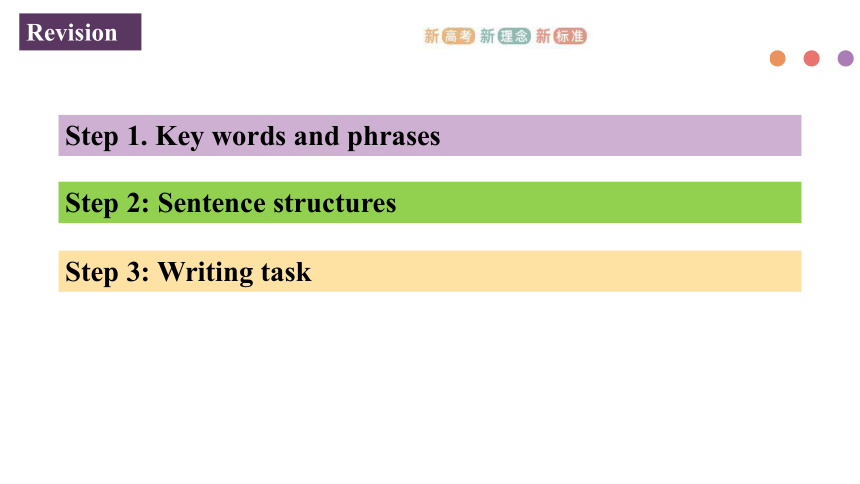
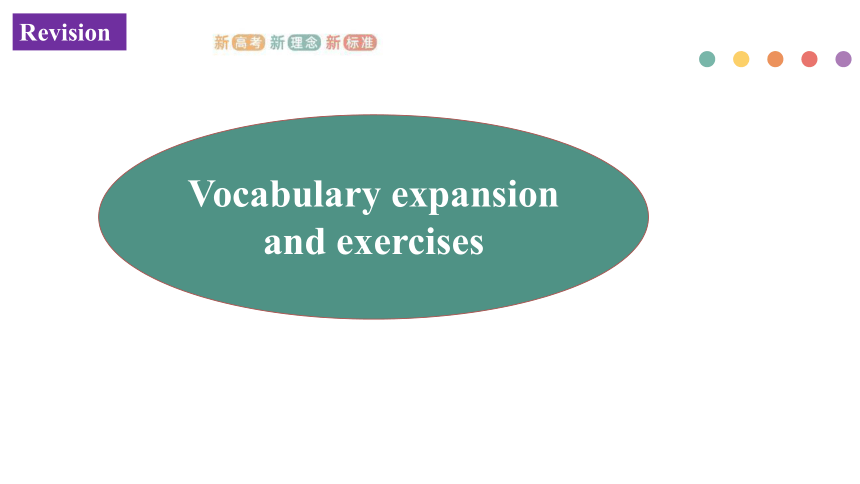
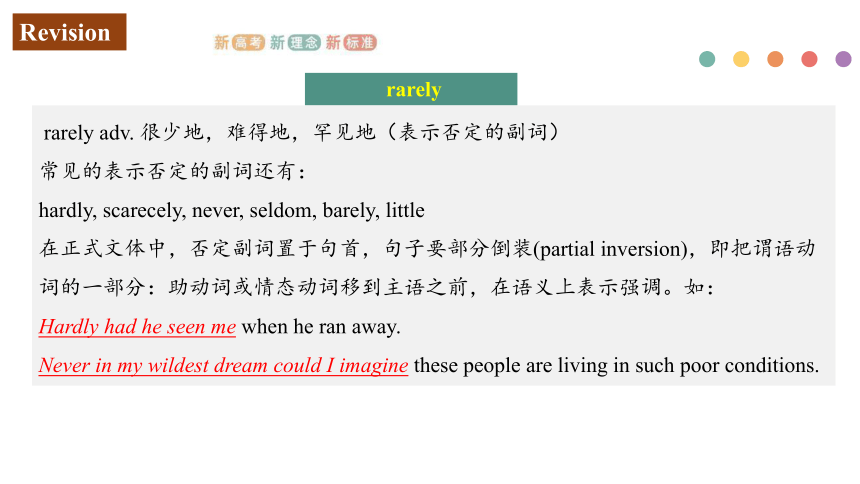
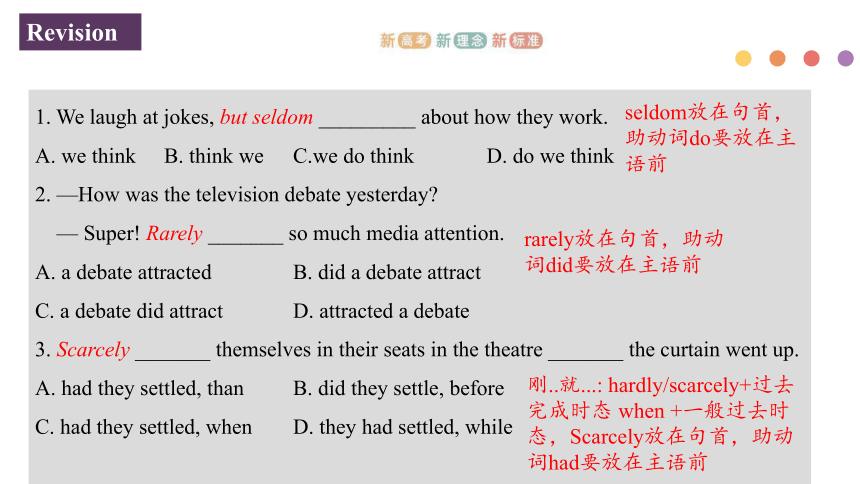
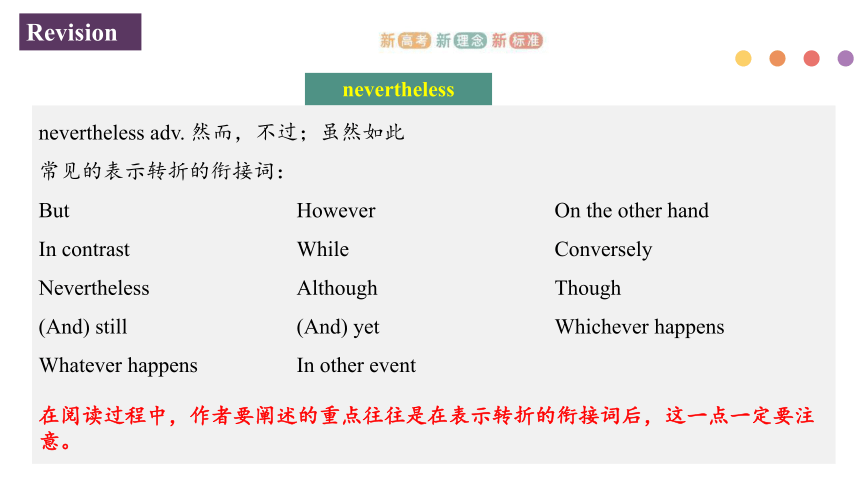
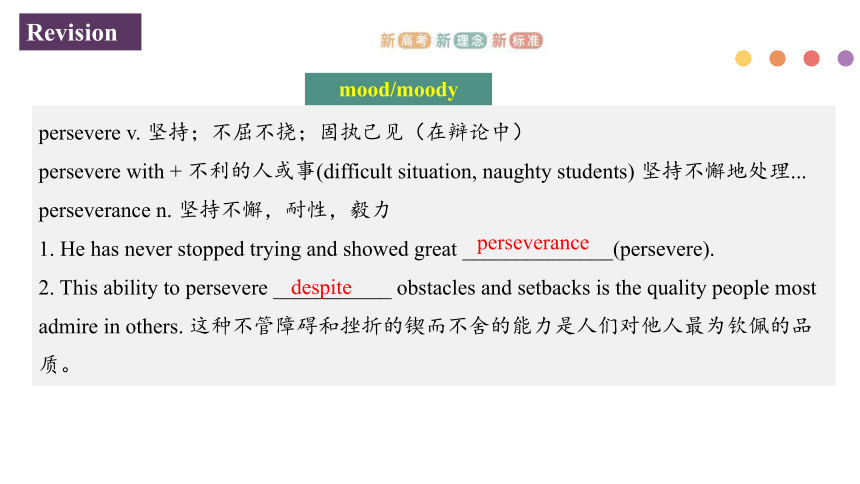

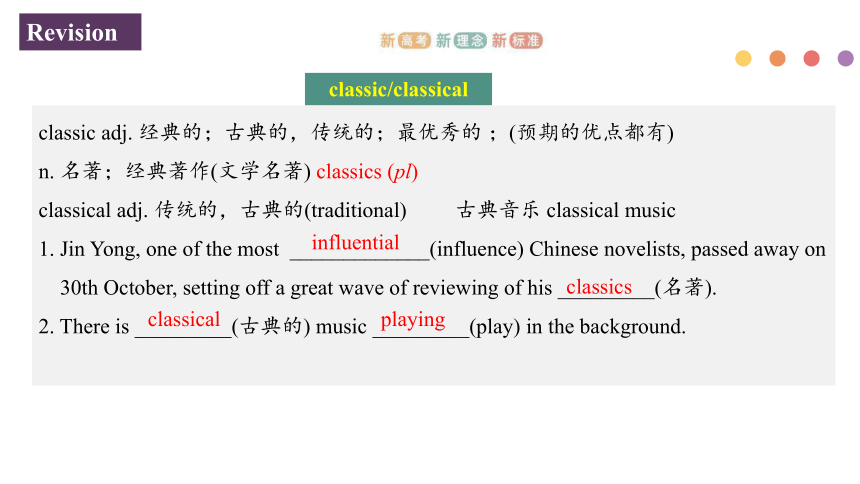


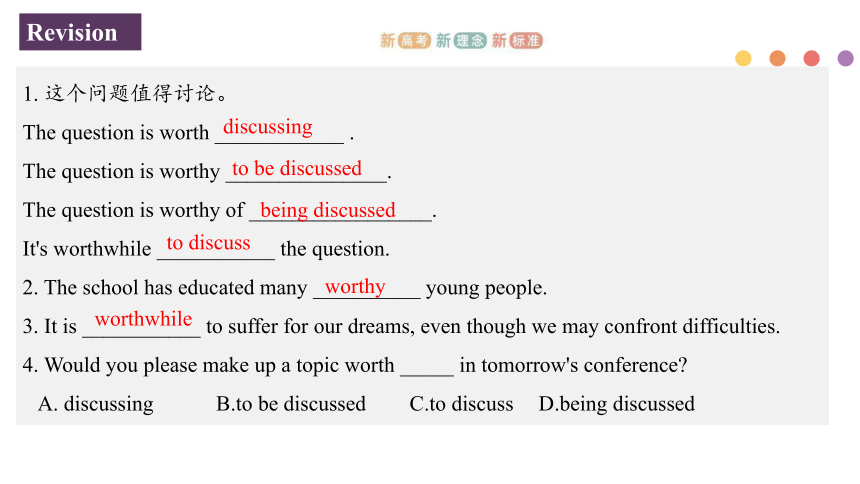
文档简介
(共43张PPT)
Period 4 Revision
Step 1. Key words and phrases
Step 2: Sentence structures
Step 3: Writing task
Revision
Revision
Vocabulary expansion
and exercises
Revision
rarely
rarely adv. 很少地,难得地,罕见地(表示否定的副词)
常见的表示否定的副词还有:
hardly, scarecely, never, seldom, barely, little
在正式文体中,否定副词置于句首,句子要部分倒装(partial inversion),即把谓语动词的一部分:助动词或情态动词移到主语之前,在语义上表示强调。如:
Hardly had he seen me when he ran away.
Never in my wildest dream could I imagine these people are living in such poor conditions.
1. We laugh at jokes, but seldom _________ about how they work.
A. we think B. think we C.we do think D. do we think
2. —How was the television debate yesterday
— Super! Rarely _______ so much media attention.
A. a debate attracted B. did a debate attract
C. a debate did attract D. attracted a debate
3. Scarcely _______ themselves in their seats in the theatre _______ the curtain went up.
A. had they settled, than B. did they settle, before
C. had they settled, when D. they had settled, while
Revision
seldom放在句首,助动词do要放在主语前
rarely放在句首,助动词did要放在主语前
刚..就...: hardly/scarcely+过去完成时态 when +一般过去时态,Scarcely放在句首,助动词had要放在主语前
Revision
nevertheless
nevertheless adv. 然而,不过;虽然如此
常见的表示转折的衔接词:
But However On the other hand
In contrast While Conversely
Nevertheless Although Though
(And) still (And) yet Whichever happens
Whatever happens In other event
在阅读过程中,作者要阐述的重点往往是在表示转折的衔接词后,这一点一定要注意。
Revision
mood/moody
persevere v. 坚持;不屈不挠;固执己见(在辩论中)
persevere with + 不利的人或事(difficult situation, naughty students) 坚持不懈地处理...
perseverance n. 坚持不懈,耐性,毅力
1. He has never stopped trying and showed great ______________(persevere).
2. This ability to persevere ___________ obstacles and setbacks is the quality people most admire in others. 这种不管障碍和挫折的锲而不舍的能力是人们对他人最为钦佩的品质。
perseverance
despite
Revision
criticism
citicize v. 批评;吹毛求疵;非难 criticise others for their faults 批评他人的过错
citicism n. 批评,反对意见,评论 under strong criticism 受到猛烈的批评
take/accept citicism 接受批评 literary criticism 文艺评论
critical adj. 关键的,批评的,批判性的,临界的 critical point 临界点
be critical of sth 对...持批评态度
critics n. 评论家,批评家
1. Don't criticise others _______their flaws if you are not willing to confess your own.
2. He says setting priorities is of _________(criticise) importance.
3. Students are encouraged to develop __________(criticise) thinking instead of accepting opinions without _____________(question) them.
for
critical
critical
questioning
Revision
classic/classical
classic adj. 经典的;古典的,传统的;最优秀的 ;(预期的优点都有)
n. 名著;经典著作(文学名著) classics (pl)
classical adj. 传统的,古典的(traditional) 古典音乐 classical music
1. Jin Yong, one of the most _____________(influence) Chinese novelists, passed away on
30th October, setting off a great wave of reviewing of his _________(名著).
2. There is _________(古典的) music _________(play) in the background.
influential
classics
classical
playing
Revision
poet/poem/poetry
poet n. 诗人
poem n. 诗歌(可数名词) poems (pl)
poetry n. 诗歌(总称,不可数名词) Russian poetry 俄罗斯诗歌
poetic adj. 诗歌的,诗人的,充满诗意的
1. The Dragon Boat Festival is in memory of a Chinese _________(诗人).
2. _________(诗歌) by Wordsworth, Gorge Gordon Byron and John Keats have long been
favorites.
3. The orchestral playing was colourful and _________(充满诗意的).
poet
Poems
poetic
Revision
worthwhile/worth/worthy
worth adj. 值得...的,可维持...时间的,价值为...的 (表语形容词,不能用作定语)
人/物+ be worth doing 值得做... (doing 以主动表示被动的意思)
worthy adj. adj. 值得的;有价值的;配得上的,相称的;令人尊敬的
人/物+ be worthy of doing 或者 be worthy to do 值得做某事...(注意主动或被动)
worthwhile adj. 值得(花时间、金钱、努力等)的;有价值的,有益的;值得做的
It's worthwhile to do 值得做某事
Revision
1. 这个问题值得讨论。
The question is worth ____________ .
The question is worthy _______________.
The question is worthy of _________________.
It's worthwhile ___________ the question.
2. The school has educated many __________ young people.
3. It is ___________ to suffer for our dreams, even though we may confront difficulties.
4. Would you please make up a topic worth _____ in tomorrow's conference
A. discussing B.to be discussed C.to discuss D.being discussed
discussing
to be discussed
being discussed
to discuss
worthy
worthwhile
Revision
gentleness
gentleness n. 温柔;亲切;高贵;
-ness 表示state, quality,加在形容词之后,构成抽象名词,表示性质、情况、动作、质量或状态
常见形容词+ness构成名词
sad-sadness lonely-loneliness kind-kindness
happy-happiness bitter-bitterness tired-tireness
aware-awareness competitive-competitiveness
1. The campaign is intended to raise public ___________(aware) of protecting our earth.
2. ____________(lonely) affects many people in old age.
awareness
Loneliness
Revision
delight/delighted/delightful
delight v.使高兴,使开心 n. 高兴(不可数),令人高兴的事(可数)
take delight in 以...为乐 in/with delight 高兴地
delighted adj. 高兴的 delightful adj.令人愉快的
1. As for me, I take great delight in ____________(garden).
2. She exclaimed _______________(高兴地) when she saw the present.
3. Space travel can be so____________(delight) but at the same time invisibly dangerous.
4. If you're not ____________(delight) with your purchase, we guarantee to refund your
money in full. 如果你对锁钩商品不满意,我们保证全额退款。
gardening
in/with delight
delightful
delighted
Revision
appreciate
appreciate vt. 欣赏;感激;领会;鉴别; vi. 增值;涨价
appreciate doing sth 感激做过某事
appreciation n. 欣赏,增值;感谢 capital appreciation资本增值
express one's appreciation for sth 因为某事表达某人的感激
appreciative adj. 感激的;赏识的;有欣赏力的;
be appreciative of one's support 对某人的支持心怀感激
1. 如能...,我将不胜感激。
2. We also appreciate your _________(provide) the useful information to us.
3. 如果我能有机会得到这份工作,我会非常感激。
I would appreciate it if ...
providing
I will be appreciative if I am offered the opportunity
Revision
haunt
haunt v. vt. 常出没于…;萦绕于…;经常去…;vi. 出没;作祟
haunt n. 经常出没的地方 haunted adj. 闹鬼的,被负面情绪困扰的
1. The Wanglang Preserve in western Sichuan is the _________(经常出没的地方) of the
giant panda.
2. There is a special section in the museum which ____________(haunt).
haunt
is haunted
Revision
embarrassed
embarrass v. 使窘迫,使尴尬;使困惑;使为难
embarrassed adj. 尴尬的,窘迫的 embarrassing adj. 令人尴尬/窘迫的
embarrassment n. 窘迫,难堪
1. We apologize for any _______________(embarrass) this may have caused.
2. He tried to avoid the _______________(embarrass)embarrassing question.
3. Cancer is a taboo subject and people are frightened or _____________(embarrass) to
talk openly about it.
4. He tried to ______________________(掩饰他的尴尬) by telling jokes.
embarrassment
embarrassing
embarrassed
hide his embarrassment
Revision
Sentence structure
-ing form & to infinitive
as object
Revision
非谓语,即“不是谓语”, 非谓语动词形式是指动词在句中不作谓语,而作其他句子成分,如主语,宾语,表语,定语,状语,补语等。在英语中,一个简单句只能有一个谓语动词,再出现动词时,要变成非谓语形式,即在动词前加to构成动词不定式(to infinitive),在动词后加-ing构成动名词或现在分词(-ing form),或在动词后加-ed构成过去分词(past participle)。
Revision
考点精讲精练:非谓语动词作宾语
考点一:有些动词只能跟 to infinitive 作宾语
afford付得起, agree同意, aim力求做到, appear显得, arrange安排,ask要求, attempt 试图,care关心, choose选择, claim声称,decide决定, demand要求,determine决心, desire渴望, endeavor竭力,expect期待, fail未能, hesitate犹豫, hope希望, learn学会,manage设法, offer主动提出,plan计划, prepare准备, pretend假装,promise答应, refuse拒绝, resolve决心, seem好像, swear发誓,tend往往会, threaten威胁, volunteer自愿做,want想要, wish希望,intend打算 happen 碰巧
Revision
典例练习
1. I expected ___________(meet) my friend, but my car broke down on the way.
2. The two weavers pretended ________ very hard, though they didi nothing at
the looms.
A. work B. working C. to be worked D. to work
3. When he got off the train, it happened ___________(rain).
4. I didn't __________________(设法做成这件事) until you had explained how.
to meet
to rain
manage to do it
Revision
考点二:有些动词只能跟 -ing form 作宾语
admit承认, appreciate感激, excuse原谅, stand忍受, advise建议, allow允许, permit允许, avoid避免, consider考虑, enjoy喜欢, finish完成, give up放弃, can't help不禁, imagine想象, keep持续,
mind介意, risk冒险, miss错过, put off推迟, delay推迟, practise练习, resist抗拒, suggest建议, escape 逃避 think about考虑,
set about开始, succeed in成功, burst out突然开始, insist on坚持,
feel like想要, be used to习惯于, devote…to…把...奉献于...,
look forward to期待, pay attention to集中精力于, get down to开始,
Revision
典例练习
1. Young people may risk ________(go) deaf if they are exposed to very loud music
every day.
2. You can keep the bokk until you have finished _________(read).
3. Ali said he wouldn't mind ___________(leave) alone at home.
4. We are considering ____________________(制定一个新计划).
5. The squirrel was lucky that it just missed ________.
A. catching B.to be caught C.being caught D.to catch
going
reading
being left
making a new plan
Revision
考点三:有些动词既能跟 -ing form 也能跟 to infinitive 作宾语,意义是不同的
remember doing/having done 记得做过某事
remember to do 记着去做某事
forget doing/having done 忘记做过某事
forget to do 忘记去做某事
mean doing 意味着做某事
mean to do 打算去做某事
—Did you close the door
—Yes, I remember _________
(close) it.
Missing the train means __________(wait) for an hour.
closing
waiting
Revision
考点三:有些动词既能跟 -ing form 也能跟 to infinitive 作宾语,意义是不同的
stop doing 停止某事
stop to do 停下来去做某事
go on doing 继续做原来的事
go on to do 接着干别的事
can't help doing 禁不住做了某事
can't help (to) do 不能帮忙做某事
I felt tired with walking, so I stopped __________(have) a break for an hour.
The teacher told the students to stop __________(write) and __________ (listen) to him.
to have
wriing
to listen
Revision
I regret ____________ (inform) you that we are unable to offer you the job.
考点三:有些动词既能跟 -ing form 也能跟 to infinitive 作宾语,意义是不同的
regret doing 后悔做过某事
regret to do 对要做的事感到遗憾
My brother regretted____________ (miss) the lecture given by Professor Liu.
try doing 尝试做某事
try to do 尽力去做某事
be/get used doing 习惯于做某事
used to do 过去常常做某事
be used to do 被用来做某事
to inform
missing
Revision
考点三:有些动词既能跟 -ing form 也能跟 to infinitive 作宾语,意义是不同的
某人want/need/reqire to do 某人想要/需要/要求做某事
某事/物 want/need/require doing/to be done 某事需要被做
1. The grass has grown so tallthat it needs ________________(cut).
2. There are lots of places of interest needing ________________________(repair).
3. These young trees require __________________(look) after carefully.
cutting/to be cut
repairing/to be repaired
looking/to be looked
Revision
1. Susan wnted to be independent of her parents. She tried __________(live) alone, but she didn't like it and moved back home.
2. —I usually go there by train.
—Why not try________(go) by boat for a change
3. I don't try _____________(memorize) speeches word for word.
尝试过,做过,doing
尽力,试图去做,to do
尝试一下,doing,改变一下
living
going
to memorize
Revision
1. I didn't mean ________(eat) anything but the ice cream looked so good that I couldn't
help _________(try) it.
2. After receiving the Oscar for Best Supporting Actress, Anne Benedict went on________
all the people who had helped in her career.
A. to thank B. thanking C. having thanked D.to have thanked
3. He hasn't got used to________(live) in the countryside yet.
4. The sentence wants________________________(explain) once more.
5. I konw it's not important, but I can't help _________(think) about it.
to eat
trying
living
explaining/to be explained
thinking
Revision
考点四:含有介词 to 的常考短语,介词后加 -ing form
be addicted to 沉溺于 be equal to 等于做某事,能胜任做某事
object to 反对 be reduced to 某人沦为做某事的地步
pay attention to 注意做某事 get down to 开始着手做某事
close to 几乎要做某事 in addition to 除做某事之外还...
(the) key to 做某事的关键 when it comes to当谈及...
make contributions to 对...做贡献
Revision
1. The key to___________(overcome) this problem is to believe in yourself.
2. Many students addicted to ____________(play) eventually get their future ruined.
3. I'm looking forward to__________(hear) from you soon.
4. A 90-year-old has been awarded “Women of the Year” for _________(be) Britain's
oldest full-time employee— still working 40hours a week.
5. Jonas is such an emotional and inspiring song that when I hear it, I always come close
to ___________(burst) into tears.
6. I knew I wasn't gifted when it comes to ___________(study).
overcoming
playing
hearing
being
bursting
studying
Revision
考点五:except, but 后面跟动词不定式时,如果前面有实义动词 do 的形式,动词不定式的to要省略掉。
1. There is nothing to do except ___________(wait) till it stops raining.
2. Standing on the top of the hill, I would not do anything but __________(enjoy)
the flowing of the fog around me.
3. The tourists have nothing to do but ___________(take) pictures of each other.
4. The young man didn't know how to do anything except ___________(spend) his
father's money.
wait
enjoy
take
spend
Revision
1. I heard a passenger behind me shouting to the driver,but he refused ____________(stop) until we reached the next stop.
2. We children were told to stay away from it as we couldn't afford __________(keep) it.
3. I managed ___________(keep) my parents in the dark about this.
4. For example, if you want to quit____________(smoke), ask why do you wnt to quit.
5. By focusing on__________(save) oil, watee, paper, food and clothing, we are playing a part in cutting down
on waste.
6. Fast food is full of fat and salt, by _________(eat) more fast food people will get more salt and fat than they
need in their diet.
7. I once wanted to be a top student, but the hard work needed meant ___________(put) everything into it.
8. I had no choice but _________(accept) it.
to stop
to keep
to keep
smoking
saving
eating
putting
to accept
Revision
Writing task
How to write an argumentation
How to write an argumentation essay
Three steps to write an argumentation
1. Selecting your point of view
2. Providing arguments and supporting examples
3. Drawing the conclusion
Revision
Read the two points of view. Choose one and write an argumentation essay.
If at first you don't succeed, try, try on and on.
If at first you don't succeed, set yourself another goal.
Revision
Revision
If at first you don't succeed, try, try on and on.
论点侧重于
1. 失败乃成功之母,从失败中汲取教训
2. 毅力在取得成功的过程中发挥重要作用
Revision
Point of view
Never give up, and you will succeed.
Your arguments and supporting examples
Argument 1:
Failure is a valuable experience from which you can attain new ideas or inspiration.
Suppoting example: Thomas Alva Edison
Argument 2:
Practice makes perfect/ Perseverance is not a long race, it's many short races one after another.
Suppoting example: Your learning experience
Conclusion
If you at first don't succeed, try on and on until you make it.
Revision
参考范文
It's a common snese that if you try something once, it probably won't be perfect, and you have to keep working on it until you succeed.
First of all, failure is a valuable experience from which you can attain new ideas or inspiration. As is known to all, Thomas Alva Edison had failed again and again before he finally found the right material for his light bulbs. In addition, the more times you failed, the more likely you could avoild making mistakes. Consequently, you could obtain necessary experience.
Success is no accident. It is hard work, learning, studying and most of all perseverance that make you successful. So if you don't succeed at first, please try on and on.
point of view
arguments
conclusion
Revision
If at first you don't succeed, set yourself another goal.
论点侧重于
1. 不断重复失败会让失败根植于你的思维,及时扭转方向是良策。
2. 制定一个更合理的新目标比反复失败反复尝试更明智
Revision
Point of view
If you at first don't succeed, set yourself another goal.
Your arguments and supporting examples
Argument 1:It's necessary to find out the reason for your failure and make a timely change.
Supporting example:
Argument 2:Set a new goal and hold on to it untill you succeed.
Supporting example:
Conclusion
When you at first don't succeed, find out the reason and set a more practical and realistic goal accordingly.
Revision
People believe practice makes perfect, but it doesn't. If you're making a tremendous amount of mistakes, all you're doing is to make the same mistakes take root in your mind. Stop repeating your mistakes, try a more reasonable goal.
When you fail, stop to figure out the reason for your your failure. You need to set a new goal and gradually make it more practical. We all know that when we have a right direction and take the proper action, becoming successful is easier. When a goal is in place and the standard has been set, hold on to the goal until you make it.
When you at first don't succeed, find out the reason and set a more practical and realistic goal accordingly.
参考范文
point of view
arguments
conclusion
感谢您的观看
Period 4 Revision
Step 1. Key words and phrases
Step 2: Sentence structures
Step 3: Writing task
Revision
Revision
Vocabulary expansion
and exercises
Revision
rarely
rarely adv. 很少地,难得地,罕见地(表示否定的副词)
常见的表示否定的副词还有:
hardly, scarecely, never, seldom, barely, little
在正式文体中,否定副词置于句首,句子要部分倒装(partial inversion),即把谓语动词的一部分:助动词或情态动词移到主语之前,在语义上表示强调。如:
Hardly had he seen me when he ran away.
Never in my wildest dream could I imagine these people are living in such poor conditions.
1. We laugh at jokes, but seldom _________ about how they work.
A. we think B. think we C.we do think D. do we think
2. —How was the television debate yesterday
— Super! Rarely _______ so much media attention.
A. a debate attracted B. did a debate attract
C. a debate did attract D. attracted a debate
3. Scarcely _______ themselves in their seats in the theatre _______ the curtain went up.
A. had they settled, than B. did they settle, before
C. had they settled, when D. they had settled, while
Revision
seldom放在句首,助动词do要放在主语前
rarely放在句首,助动词did要放在主语前
刚..就...: hardly/scarcely+过去完成时态 when +一般过去时态,Scarcely放在句首,助动词had要放在主语前
Revision
nevertheless
nevertheless adv. 然而,不过;虽然如此
常见的表示转折的衔接词:
But However On the other hand
In contrast While Conversely
Nevertheless Although Though
(And) still (And) yet Whichever happens
Whatever happens In other event
在阅读过程中,作者要阐述的重点往往是在表示转折的衔接词后,这一点一定要注意。
Revision
mood/moody
persevere v. 坚持;不屈不挠;固执己见(在辩论中)
persevere with + 不利的人或事(difficult situation, naughty students) 坚持不懈地处理...
perseverance n. 坚持不懈,耐性,毅力
1. He has never stopped trying and showed great ______________(persevere).
2. This ability to persevere ___________ obstacles and setbacks is the quality people most admire in others. 这种不管障碍和挫折的锲而不舍的能力是人们对他人最为钦佩的品质。
perseverance
despite
Revision
criticism
citicize v. 批评;吹毛求疵;非难 criticise others for their faults 批评他人的过错
citicism n. 批评,反对意见,评论 under strong criticism 受到猛烈的批评
take/accept citicism 接受批评 literary criticism 文艺评论
critical adj. 关键的,批评的,批判性的,临界的 critical point 临界点
be critical of sth 对...持批评态度
critics n. 评论家,批评家
1. Don't criticise others _______their flaws if you are not willing to confess your own.
2. He says setting priorities is of _________(criticise) importance.
3. Students are encouraged to develop __________(criticise) thinking instead of accepting opinions without _____________(question) them.
for
critical
critical
questioning
Revision
classic/classical
classic adj. 经典的;古典的,传统的;最优秀的 ;(预期的优点都有)
n. 名著;经典著作(文学名著) classics (pl)
classical adj. 传统的,古典的(traditional) 古典音乐 classical music
1. Jin Yong, one of the most _____________(influence) Chinese novelists, passed away on
30th October, setting off a great wave of reviewing of his _________(名著).
2. There is _________(古典的) music _________(play) in the background.
influential
classics
classical
playing
Revision
poet/poem/poetry
poet n. 诗人
poem n. 诗歌(可数名词) poems (pl)
poetry n. 诗歌(总称,不可数名词) Russian poetry 俄罗斯诗歌
poetic adj. 诗歌的,诗人的,充满诗意的
1. The Dragon Boat Festival is in memory of a Chinese _________(诗人).
2. _________(诗歌) by Wordsworth, Gorge Gordon Byron and John Keats have long been
favorites.
3. The orchestral playing was colourful and _________(充满诗意的).
poet
Poems
poetic
Revision
worthwhile/worth/worthy
worth adj. 值得...的,可维持...时间的,价值为...的 (表语形容词,不能用作定语)
人/物+ be worth doing 值得做... (doing 以主动表示被动的意思)
worthy adj. adj. 值得的;有价值的;配得上的,相称的;令人尊敬的
人/物+ be worthy of doing 或者 be worthy to do 值得做某事...(注意主动或被动)
worthwhile adj. 值得(花时间、金钱、努力等)的;有价值的,有益的;值得做的
It's worthwhile to do 值得做某事
Revision
1. 这个问题值得讨论。
The question is worth ____________ .
The question is worthy _______________.
The question is worthy of _________________.
It's worthwhile ___________ the question.
2. The school has educated many __________ young people.
3. It is ___________ to suffer for our dreams, even though we may confront difficulties.
4. Would you please make up a topic worth _____ in tomorrow's conference
A. discussing B.to be discussed C.to discuss D.being discussed
discussing
to be discussed
being discussed
to discuss
worthy
worthwhile
Revision
gentleness
gentleness n. 温柔;亲切;高贵;
-ness 表示state, quality,加在形容词之后,构成抽象名词,表示性质、情况、动作、质量或状态
常见形容词+ness构成名词
sad-sadness lonely-loneliness kind-kindness
happy-happiness bitter-bitterness tired-tireness
aware-awareness competitive-competitiveness
1. The campaign is intended to raise public ___________(aware) of protecting our earth.
2. ____________(lonely) affects many people in old age.
awareness
Loneliness
Revision
delight/delighted/delightful
delight v.使高兴,使开心 n. 高兴(不可数),令人高兴的事(可数)
take delight in 以...为乐 in/with delight 高兴地
delighted adj. 高兴的 delightful adj.令人愉快的
1. As for me, I take great delight in ____________(garden).
2. She exclaimed _______________(高兴地) when she saw the present.
3. Space travel can be so____________(delight) but at the same time invisibly dangerous.
4. If you're not ____________(delight) with your purchase, we guarantee to refund your
money in full. 如果你对锁钩商品不满意,我们保证全额退款。
gardening
in/with delight
delightful
delighted
Revision
appreciate
appreciate vt. 欣赏;感激;领会;鉴别; vi. 增值;涨价
appreciate doing sth 感激做过某事
appreciation n. 欣赏,增值;感谢 capital appreciation资本增值
express one's appreciation for sth 因为某事表达某人的感激
appreciative adj. 感激的;赏识的;有欣赏力的;
be appreciative of one's support 对某人的支持心怀感激
1. 如能...,我将不胜感激。
2. We also appreciate your _________(provide) the useful information to us.
3. 如果我能有机会得到这份工作,我会非常感激。
I would appreciate it if ...
providing
I will be appreciative if I am offered the opportunity
Revision
haunt
haunt v. vt. 常出没于…;萦绕于…;经常去…;vi. 出没;作祟
haunt n. 经常出没的地方 haunted adj. 闹鬼的,被负面情绪困扰的
1. The Wanglang Preserve in western Sichuan is the _________(经常出没的地方) of the
giant panda.
2. There is a special section in the museum which ____________(haunt).
haunt
is haunted
Revision
embarrassed
embarrass v. 使窘迫,使尴尬;使困惑;使为难
embarrassed adj. 尴尬的,窘迫的 embarrassing adj. 令人尴尬/窘迫的
embarrassment n. 窘迫,难堪
1. We apologize for any _______________(embarrass) this may have caused.
2. He tried to avoid the _______________(embarrass)embarrassing question.
3. Cancer is a taboo subject and people are frightened or _____________(embarrass) to
talk openly about it.
4. He tried to ______________________(掩饰他的尴尬) by telling jokes.
embarrassment
embarrassing
embarrassed
hide his embarrassment
Revision
Sentence structure
-ing form & to infinitive
as object
Revision
非谓语,即“不是谓语”, 非谓语动词形式是指动词在句中不作谓语,而作其他句子成分,如主语,宾语,表语,定语,状语,补语等。在英语中,一个简单句只能有一个谓语动词,再出现动词时,要变成非谓语形式,即在动词前加to构成动词不定式(to infinitive),在动词后加-ing构成动名词或现在分词(-ing form),或在动词后加-ed构成过去分词(past participle)。
Revision
考点精讲精练:非谓语动词作宾语
考点一:有些动词只能跟 to infinitive 作宾语
afford付得起, agree同意, aim力求做到, appear显得, arrange安排,ask要求, attempt 试图,care关心, choose选择, claim声称,decide决定, demand要求,determine决心, desire渴望, endeavor竭力,expect期待, fail未能, hesitate犹豫, hope希望, learn学会,manage设法, offer主动提出,plan计划, prepare准备, pretend假装,promise答应, refuse拒绝, resolve决心, seem好像, swear发誓,tend往往会, threaten威胁, volunteer自愿做,want想要, wish希望,intend打算 happen 碰巧
Revision
典例练习
1. I expected ___________(meet) my friend, but my car broke down on the way.
2. The two weavers pretended ________ very hard, though they didi nothing at
the looms.
A. work B. working C. to be worked D. to work
3. When he got off the train, it happened ___________(rain).
4. I didn't __________________(设法做成这件事) until you had explained how.
to meet
to rain
manage to do it
Revision
考点二:有些动词只能跟 -ing form 作宾语
admit承认, appreciate感激, excuse原谅, stand忍受, advise建议, allow允许, permit允许, avoid避免, consider考虑, enjoy喜欢, finish完成, give up放弃, can't help不禁, imagine想象, keep持续,
mind介意, risk冒险, miss错过, put off推迟, delay推迟, practise练习, resist抗拒, suggest建议, escape 逃避 think about考虑,
set about开始, succeed in成功, burst out突然开始, insist on坚持,
feel like想要, be used to习惯于, devote…to…把...奉献于...,
look forward to期待, pay attention to集中精力于, get down to开始,
Revision
典例练习
1. Young people may risk ________(go) deaf if they are exposed to very loud music
every day.
2. You can keep the bokk until you have finished _________(read).
3. Ali said he wouldn't mind ___________(leave) alone at home.
4. We are considering ____________________(制定一个新计划).
5. The squirrel was lucky that it just missed ________.
A. catching B.to be caught C.being caught D.to catch
going
reading
being left
making a new plan
Revision
考点三:有些动词既能跟 -ing form 也能跟 to infinitive 作宾语,意义是不同的
remember doing/having done 记得做过某事
remember to do 记着去做某事
forget doing/having done 忘记做过某事
forget to do 忘记去做某事
mean doing 意味着做某事
mean to do 打算去做某事
—Did you close the door
—Yes, I remember _________
(close) it.
Missing the train means __________(wait) for an hour.
closing
waiting
Revision
考点三:有些动词既能跟 -ing form 也能跟 to infinitive 作宾语,意义是不同的
stop doing 停止某事
stop to do 停下来去做某事
go on doing 继续做原来的事
go on to do 接着干别的事
can't help doing 禁不住做了某事
can't help (to) do 不能帮忙做某事
I felt tired with walking, so I stopped __________(have) a break for an hour.
The teacher told the students to stop __________(write) and __________ (listen) to him.
to have
wriing
to listen
Revision
I regret ____________ (inform) you that we are unable to offer you the job.
考点三:有些动词既能跟 -ing form 也能跟 to infinitive 作宾语,意义是不同的
regret doing 后悔做过某事
regret to do 对要做的事感到遗憾
My brother regretted____________ (miss) the lecture given by Professor Liu.
try doing 尝试做某事
try to do 尽力去做某事
be/get used doing 习惯于做某事
used to do 过去常常做某事
be used to do 被用来做某事
to inform
missing
Revision
考点三:有些动词既能跟 -ing form 也能跟 to infinitive 作宾语,意义是不同的
某人want/need/reqire to do 某人想要/需要/要求做某事
某事/物 want/need/require doing/to be done 某事需要被做
1. The grass has grown so tallthat it needs ________________(cut).
2. There are lots of places of interest needing ________________________(repair).
3. These young trees require __________________(look) after carefully.
cutting/to be cut
repairing/to be repaired
looking/to be looked
Revision
1. Susan wnted to be independent of her parents. She tried __________(live) alone, but she didn't like it and moved back home.
2. —I usually go there by train.
—Why not try________(go) by boat for a change
3. I don't try _____________(memorize) speeches word for word.
尝试过,做过,doing
尽力,试图去做,to do
尝试一下,doing,改变一下
living
going
to memorize
Revision
1. I didn't mean ________(eat) anything but the ice cream looked so good that I couldn't
help _________(try) it.
2. After receiving the Oscar for Best Supporting Actress, Anne Benedict went on________
all the people who had helped in her career.
A. to thank B. thanking C. having thanked D.to have thanked
3. He hasn't got used to________(live) in the countryside yet.
4. The sentence wants________________________(explain) once more.
5. I konw it's not important, but I can't help _________(think) about it.
to eat
trying
living
explaining/to be explained
thinking
Revision
考点四:含有介词 to 的常考短语,介词后加 -ing form
be addicted to 沉溺于 be equal to 等于做某事,能胜任做某事
object to 反对 be reduced to 某人沦为做某事的地步
pay attention to 注意做某事 get down to 开始着手做某事
close to 几乎要做某事 in addition to 除做某事之外还...
(the) key to 做某事的关键 when it comes to当谈及...
make contributions to 对...做贡献
Revision
1. The key to___________(overcome) this problem is to believe in yourself.
2. Many students addicted to ____________(play) eventually get their future ruined.
3. I'm looking forward to__________(hear) from you soon.
4. A 90-year-old has been awarded “Women of the Year” for _________(be) Britain's
oldest full-time employee— still working 40hours a week.
5. Jonas is such an emotional and inspiring song that when I hear it, I always come close
to ___________(burst) into tears.
6. I knew I wasn't gifted when it comes to ___________(study).
overcoming
playing
hearing
being
bursting
studying
Revision
考点五:except, but 后面跟动词不定式时,如果前面有实义动词 do 的形式,动词不定式的to要省略掉。
1. There is nothing to do except ___________(wait) till it stops raining.
2. Standing on the top of the hill, I would not do anything but __________(enjoy)
the flowing of the fog around me.
3. The tourists have nothing to do but ___________(take) pictures of each other.
4. The young man didn't know how to do anything except ___________(spend) his
father's money.
wait
enjoy
take
spend
Revision
1. I heard a passenger behind me shouting to the driver,but he refused ____________(stop) until we reached the next stop.
2. We children were told to stay away from it as we couldn't afford __________(keep) it.
3. I managed ___________(keep) my parents in the dark about this.
4. For example, if you want to quit____________(smoke), ask why do you wnt to quit.
5. By focusing on__________(save) oil, watee, paper, food and clothing, we are playing a part in cutting down
on waste.
6. Fast food is full of fat and salt, by _________(eat) more fast food people will get more salt and fat than they
need in their diet.
7. I once wanted to be a top student, but the hard work needed meant ___________(put) everything into it.
8. I had no choice but _________(accept) it.
to stop
to keep
to keep
smoking
saving
eating
putting
to accept
Revision
Writing task
How to write an argumentation
How to write an argumentation essay
Three steps to write an argumentation
1. Selecting your point of view
2. Providing arguments and supporting examples
3. Drawing the conclusion
Revision
Read the two points of view. Choose one and write an argumentation essay.
If at first you don't succeed, try, try on and on.
If at first you don't succeed, set yourself another goal.
Revision
Revision
If at first you don't succeed, try, try on and on.
论点侧重于
1. 失败乃成功之母,从失败中汲取教训
2. 毅力在取得成功的过程中发挥重要作用
Revision
Point of view
Never give up, and you will succeed.
Your arguments and supporting examples
Argument 1:
Failure is a valuable experience from which you can attain new ideas or inspiration.
Suppoting example: Thomas Alva Edison
Argument 2:
Practice makes perfect/ Perseverance is not a long race, it's many short races one after another.
Suppoting example: Your learning experience
Conclusion
If you at first don't succeed, try on and on until you make it.
Revision
参考范文
It's a common snese that if you try something once, it probably won't be perfect, and you have to keep working on it until you succeed.
First of all, failure is a valuable experience from which you can attain new ideas or inspiration. As is known to all, Thomas Alva Edison had failed again and again before he finally found the right material for his light bulbs. In addition, the more times you failed, the more likely you could avoild making mistakes. Consequently, you could obtain necessary experience.
Success is no accident. It is hard work, learning, studying and most of all perseverance that make you successful. So if you don't succeed at first, please try on and on.
point of view
arguments
conclusion
Revision
If at first you don't succeed, set yourself another goal.
论点侧重于
1. 不断重复失败会让失败根植于你的思维,及时扭转方向是良策。
2. 制定一个更合理的新目标比反复失败反复尝试更明智
Revision
Point of view
If you at first don't succeed, set yourself another goal.
Your arguments and supporting examples
Argument 1:It's necessary to find out the reason for your failure and make a timely change.
Supporting example:
Argument 2:Set a new goal and hold on to it untill you succeed.
Supporting example:
Conclusion
When you at first don't succeed, find out the reason and set a more practical and realistic goal accordingly.
Revision
People believe practice makes perfect, but it doesn't. If you're making a tremendous amount of mistakes, all you're doing is to make the same mistakes take root in your mind. Stop repeating your mistakes, try a more reasonable goal.
When you fail, stop to figure out the reason for your your failure. You need to set a new goal and gradually make it more practical. We all know that when we have a right direction and take the proper action, becoming successful is easier. When a goal is in place and the standard has been set, hold on to the goal until you make it.
When you at first don't succeed, find out the reason and set a more practical and realistic goal accordingly.
参考范文
point of view
arguments
conclusion
感谢您的观看
